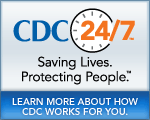Adverse Drug Events in Adults
An adverse drug event (ADE) is when someone is harmed by a medicine. Older adults (65 years or older) visit emergency departments almost 450,000 times each year, more than twice as often as younger persons.
Older adults are nearly seven times more likely than younger persons to be hospitalized after an emergency visit, but most of these hospitalizations are due to just a few drugs that should be monitored carefully to prevent problems. Blood thinners (such as warfarin), diabetes medications (such as insulin), seizure medications (such as phenytoin), and prescription opioids are some examples of these medications.

To reduce the risk of harm from adverse drug events in adults:
- Keep a list of your medicines
- Follow directions
- Ask questions
- Keep up with any blood testing recommended by your doctor
- Take all medicines only as directed
Adverse drug events cause approximately 1.3 million emergency department visits each year. About 350,000 patients each year need to be hospitalized for further treatment after emergency visits for adverse drug events. People typically take more medicines as they age, and the risk of adverse events may increase as more people take more medicines.

Getting a blood test is one way to make sure the dose of your medicine is just right for you. More than 40 percent of emergency visits that require patients to be hospitalized are caused by just a few medicines that require regular blood test monitoring.
Tip: Ask your doctor or pharmacist if you are taking any medicines that need blood testing. Pay particular attention to taking these drugs properly and getting regular blood tests and follow-up.
Examples of common drugs that can require monitoring are:
- Blood thinners (warfarin)
- Diabetes medicines (insulin)
- Seizure medicines (phenytoin, carbamazepine)
- Heart medicine (digoxin)
However, overdoses of opioid analgesics have contributed to a national epidemic. In 2015, more than 15,000 people died from overdoses involving prescription opioids.
Tip: Take pain relievers only as directed. If you are taking opioid pain relievers, be sure to tell your doctor about all other medicines you are taking because some medicines, when taken together with pain relievers, can cause an overdose.
Although antibiotics are good drugs for certain types of infections, they are also one of the types of medicines that cause the most emergency visits for adverse drug events. Approximately 150,000 adults are treated in emergency departments each year because of adverse events from antibiotics.
Antibiotics can kill bacteria, but not viruses. Most colds, coughs, flu, sore throats, and runny noses are caused by viruses. Taking antibiotics will not cure a viral infection, keep others from catching the illness, or help you feel better.
- Tip: Do not ask for antibiotics when a doctor says they are not needed. Learn more about when antibiotics work.
- If you are prescribed an antibiotic, make sure to take all the medicine as prescribed, even if you feel better. Do not save antibiotics for later.
Learn more about adverse drug events from specific medicines, including antibiotics, blood thinners, and insulin.
- Articles on adverse drug events in older adults, CDC
- Opioid Overdose, CDC
- Be Antibiotics Aware, CDC
- Tips to Prevent Poisonings, CDC
- Blood Thinner Pills: Your Guide to Using them Safely, Agency for Healthcare Research and Quality
- Ensuring Safe Use of Medicine, Food and Drug Administration
- Safe Use of Medicines for Older Adults, NIH National Institute on Aging
- For Safe Use of Oral Anticoagulants, SOS Rx
- Let’s Talk About Meds [PDF – 4 Pages], AARP
- ConsumerMedSafety.org, Institute for Safe Medication Practices
